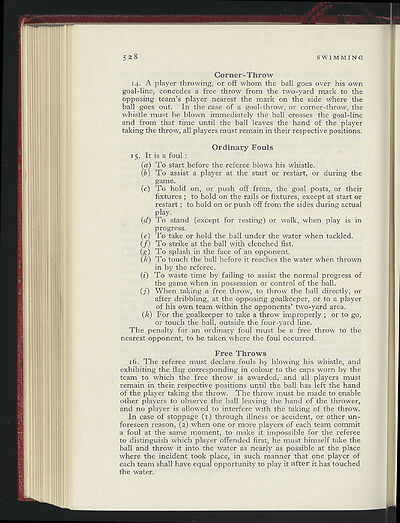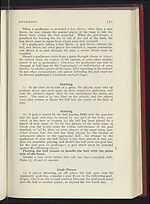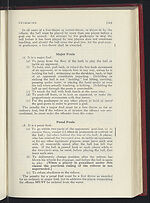1938-39
(558)
Download files
Complete book:
Individual page:
Thumbnail gallery: Grid view | List view

it
C
.
i
528
SWIMMING
Corner-Throw
14.
A player throwing, or off whom the ball goes over his own
goal-line, concedes a free throw from the two-yard mark to the
opposing team's player nearest the mark on the side where the
ball goes out. In the case of a goal-throw, or corner-throw, the
whistle. must be blown immediately the ball crosses the goal-line
and from that time until the ball leaves the hand of the player
taking the throw, all players must remain in their respective positions.
Ordinary Fouls
15. It is a foul :
(a) To start before the referee blows his whistle.
(b)
To
assist a player at the start or restart, or during the
game.
(c) To hold on, or push off from, the goal posts, or their
fixtures ; to hold on the rails or fixtures, except at start or
restart ; to hold on or push off from the sides during actual
play.
(d) To stand (except for resting) or walk, when play is in
progress.
(e) To take or hold the ball under the water when tackled.
(f) To strike at the ball with clenched fist.
(g) To splash in the face of an opponent.
(h) To touch the ball before it reaches the water when thrown
in by the referee.
(i) To waste time by failing to assist the normal progress of
the game when in possession or control of the ball.
(j) When taking a free throw, to throw the ball directly, or
after dribbling, at the opposing goalkeeper, or to a player
of his own team within the opponents' two-yard area.
(k) For the goalkeeper to take a throw improperly; or to go,
or touch the ball, outside the four-yard line.
The penalty for an ordinary foul must be a free throw to the
nearest opponent, to be taken where the foul occurred.
Free Throws
16.
The referee must declare fouls by blowing his whistle, and
exhibiting the flag corresponding in colour to the caps worn by the
team to which the free throw is awarded, and all players must
remain in their respective positions until the ball has left the hand
of the player taking the throw. The throw must be made to enable
other players to observe the ball leaving the hand of the thrower,
and no player is allowed to interfere with the taking of the throw.
In case of stoppage
(I)
through illness or accident, or other un-
foreseen reason, (2) when one or more players of each team commit
a foul at the same moment, to make it impossible for the referee
to distinguish which player offended first, he must himself take the
ball and throw it into the water as nearly as possible at the place
where the incident took place, in such manner that one player of
each team shall have equal opportunity to play it after it has touched
the water.
C
.
i
528
SWIMMING
Corner-Throw
14.
A player throwing, or off whom the ball goes over his own
goal-line, concedes a free throw from the two-yard mark to the
opposing team's player nearest the mark on the side where the
ball goes out. In the case of a goal-throw, or corner-throw, the
whistle. must be blown immediately the ball crosses the goal-line
and from that time until the ball leaves the hand of the player
taking the throw, all players must remain in their respective positions.
Ordinary Fouls
15. It is a foul :
(a) To start before the referee blows his whistle.
(b)
To
assist a player at the start or restart, or during the
game.
(c) To hold on, or push off from, the goal posts, or their
fixtures ; to hold on the rails or fixtures, except at start or
restart ; to hold on or push off from the sides during actual
play.
(d) To stand (except for resting) or walk, when play is in
progress.
(e) To take or hold the ball under the water when tackled.
(f) To strike at the ball with clenched fist.
(g) To splash in the face of an opponent.
(h) To touch the ball before it reaches the water when thrown
in by the referee.
(i) To waste time by failing to assist the normal progress of
the game when in possession or control of the ball.
(j) When taking a free throw, to throw the ball directly, or
after dribbling, at the opposing goalkeeper, or to a player
of his own team within the opponents' two-yard area.
(k) For the goalkeeper to take a throw improperly; or to go,
or touch the ball, outside the four-yard line.
The penalty for an ordinary foul must be a free throw to the
nearest opponent, to be taken where the foul occurred.
Free Throws
16.
The referee must declare fouls by blowing his whistle, and
exhibiting the flag corresponding in colour to the caps worn by the
team to which the free throw is awarded, and all players must
remain in their respective positions until the ball has left the hand
of the player taking the throw. The throw must be made to enable
other players to observe the ball leaving the hand of the thrower,
and no player is allowed to interfere with the taking of the throw.
In case of stoppage
(I)
through illness or accident, or other un-
foreseen reason, (2) when one or more players of each team commit
a foul at the same moment, to make it impossible for the referee
to distinguish which player offended first, he must himself take the
ball and throw it into the water as nearly as possible at the place
where the incident took place, in such manner that one player of
each team shall have equal opportunity to play it after it has touched
the water.
Set display mode to:
![]() Universal Viewer |
Universal Viewer | ![]() Mirador |
Large image | Transcription
Mirador |
Large image | Transcription
| Games and sports in the army > 1938-39 > (558) |
|---|
| Permanent URL | https://digital.nls.uk/248743860 |
|---|
| Description | 'Games and Sports in the Army' was an annual publication produced by the British War Office between the 1930s and 1960s. This included the Second World War. It outlines the rules and regulations for games and sports played by members of the armed forces. It features names and photographs of team members, and examples of contemporary advertising. |
|---|---|
| Shelfmark | GWB.52 |

